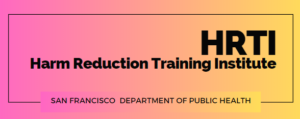Healthcare for People Experiencing Homelessness: Barriers and Strategies That Work (2024-2025)
April 2, 2024 9-10:30AM

Training Overview:
People experiencing homelessness suffer illness and premature death at rates much higher than the general population. Black / African American people are severely over-represented among people experiencing homelessness nationally and particularly in San Francisco. This webinar will address the causes of these disparities and strategies for mitigating their adverse effects.
At the conclusion of this training, participants should be able to:
- identify at least 3 barriers to healthcare for people experiencing homelessness relevant to their work setting.
- address the health effects of intersecting disability, disadvantage and discrimination on people experiencing homelessness.
- identify 3 strategies relevant to their work setting for improving healthcare access and reducing healthcare disparities for people experiencing homelessness.
About the Trainer:
Barry Zevin, MD is Medical Director of Whole Person Integrated Care: Street Medicine, Shelter Health and Maria X Martinez Health Resource Center for the San Francisco Department of Public Health. He has 32 years of experience as a physician delivering healthcare to people experiencing homelessness in San Francisco. He is Clinical Professor of Medicine at University of California San Francisco School of Medicine. Dr. Zevin has provided leadership for many innovative SFDPH projects including the current low barrier buprenorphine project to improve access to treatment for addiction disorders for individuals experiencing homelessness.
Instructions:
- Watch all four video segments. You will not be able to progress through the course until you’ve completed each segment. For closed captions, go to the lower right hand corner of the video screen and click on the three vertical dots. Click on closed captions to turn English captions on. Enable cookies on your computer to save your progress.
- Complete the evaluation.
- Pass the quiz.
- You will find a certificate of completion on your learning dashboard.
- If you are requesting CEs, CE certificates will be sent separately.
- A copy of the powerpoint slides and a list of references can be downloaded from the Resources section, under Course Tools, on the menu on the right.

As of June 19, 2024, we are no longer providing CEs for taking this course. Everyone who has requested CEs for this course prior to June 19th should’ve received their CE certificates by email.
Attending one of these trainings fulfills the annual harm reduction training contract requirement, which is part of the SFDPH Declaration of Compliance for SFDPH systems of care and funded agencies that provide direct service to clients.
Equity Statement
The San Francisco Department of Public Health is committed to leading with race and prioritizing Intersectionality, including sex, gender, sexual orientation, age, class, nationality, language, and ability. SFDPH strives to move forward on the continuum of becoming an anti-racist institution through dismantling racism, building, building solidarity among racial groups, and working towards becoming a Trauma-Informed/Trauma Healing Organization in partnership with staff, clients, communities, and our contractors. When attending, SFDP trainings, events, and/or meetings, we uphold expectations and standards of rules of engagement for our employees and contractors. We expect that all participants operate in professional integrity and adhere to the DPH Employee Code of Conduct or their employee conduct. Participants will be accountable for upholding any group agreements provided by the trainer or host and uphold principles of transparency, confidentiality and respect. We support respectful participation across intersecting identities and experiences including race, ethnicity, sex, gender, sexual orientation, age, class, nationality, religion, language, physical and mental ability, and political ideology. While we strive to make an space of inclusivity, belonging, and hub for various perspective, we do not tolerate any inappropriate behavior or comments rooted in anti-blackness, homophobia, transphobia, xenophobia, sexism, or any comments or behavior that is discriminatory, disruptive, or divisive. If participants cannot abide by these expectations, they will be removed from the training or event and will not be allowed to attend any additional DPH trainings, event, and/or meetings. Trainers have been informed to notify DPH of any misconduct and a DPH representative will follow up with that employee’s supervisor or participant’s agency regarding the misconduct.





